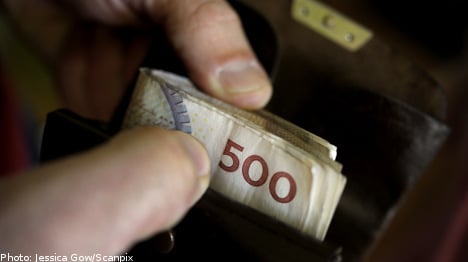Households with high mortgages, and pensioners, are the groups feeling the biggest pinch over the past year, according to the bank’s estimates.
Mortgages are not the only item pushing up household costs, the bank observed, with bills for electricity, telecom, food, clothing and newspapers all having risen over the past year.
There is however some respite in the form of decreased union and employment insurance scheme membership costs.
Families with two children living in rented accommodation are those who have experienced the best development in their disposable incomes over the past few years, with a increase recorded every year between 1998 and 2010.
“The biggest climb was in 2002 thanks to substantial pay increases and the introduction of the cap on preschool costs,” Maria Ahrengart at Swedbank said in a statement.
The government’s introduction and expansion of an in-work tax credit has also improved the situation of many people in recent years.
Despite the downturn this year, child families in rented accommodation are those with the most money left over once necessary expenses have been paid.
The financial situation of families who own their homes varies more significantly from year to year, as most of whom service large mortgages. This is also the group which will suffer the greatest drop in disposable income in 2001, due to interest rate rises.
Sweden’s Riksbank is expected to raise the base repo rate by one percentage point in 2010 and if mortgage rates follow accordingly this would equate to a rise in monthly mortgage costs by around 580 kronor ($91) after tax per million kronor in mortgage loans.
Single parents and pensioners are two groups which have fallen behind in the development of disposable income over the past year.
“The support which society gives to single parents is not linked to price and income growth. The child allowance was raised on July 1st last year, but both maintenance and housing benefit erode in value each year,” Ahrengart explained.
Retired couples who suffered a drop in their pensions last year, stand in line for further falls this year.
“Over the past two years they have lost nearly 800 kronor a month. That is a lot of money,” Ahrengart said.



 Please whitelist us to continue reading.
Please whitelist us to continue reading.
Member comments